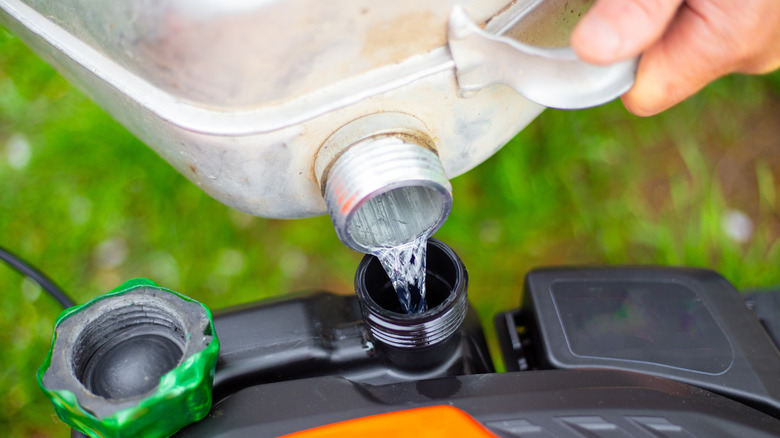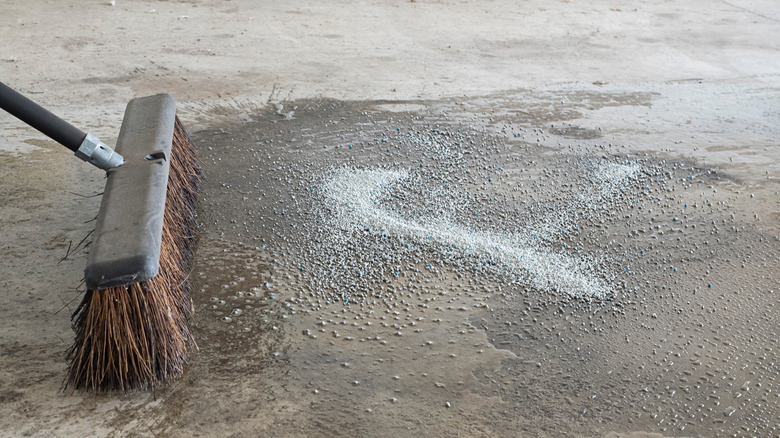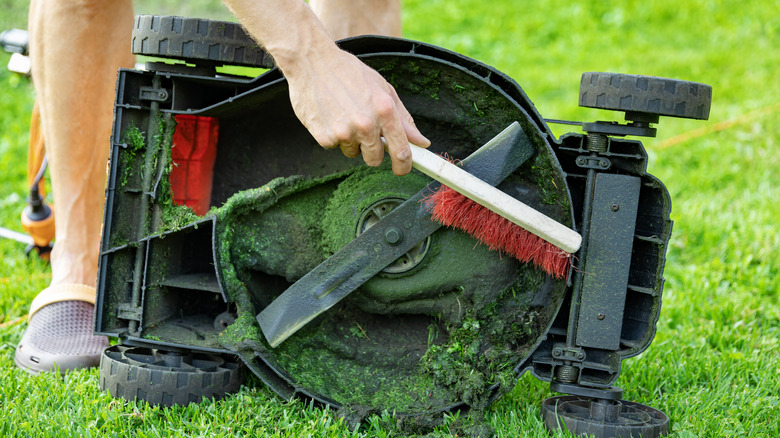What To Do If You Spill Gas On Your Lawn Mower
We may receive a commission on purchases made from links.
If you own a gasoline-powered mower, there's a good chance you've spilled gas on it at some point. It's nearly impossible to avoid, after all. You're standing there covered in sweat, trying to carefully tip fuel from a gas can that weighs 30 pounds into a filler port the size of your fire insurance coverage. Anything — a muscle twitch, an unusually gregarious wasp, or an errant soccer ball — can cause you to wobble just enough to spill a few ounces of gas on your mower's deck.
It's not the end of the world. Probably. You probably know better than to refuel a hot lawn mower, but most of us have done it at least once. And the combination can be disastrous. Consider the Kansas man who was filling up his mower between his home and a neighbor's. He spilled some gas, and that — combined with a host of complicating factors, like a backfiring mower, low humidity, and wind-tunnel-like conditions between the houses — started a blaze that spread to a couch and then went on to destroy both homes.
If all of that makes a fire seem less likely, think again. Mower fires are more common than you might realize, are usually caused by hot mowers, and are made worse by weather and seasonal conditions. Spilling gas on your lawn or driveway is a problem that needs to be addressed, to be sure, but it only takes a little fuel spilled on your mower to ruin your day ... or worse.
How to clean your mower after a gas spill
Cleaning a gas spill from a mower might seem like a simple matter, but some simple things are a lot more complicated or dangerous than you think. Consider the impulse to wash a gas spill away with water. Consider it, but don't do it — this will just spread the gas around and make things worse. And while it's unlikely you'll spill enough gas to think of breaking out your wet/dry shop vac, don't even consider it. Most shop vacs don't have sealed motors, so by attempting to suck up the gasoline, you could starte the fire you were trying to prevent.
But it doesn't have to be overly complicated. The first thing to do is try to ventilate the area where the mower is sitting to disperse the fumes and keep yourself safer. It's probably best to avoid moving the mower if you can, and it might be counterproductive to move the mower to a windy area. So use your judgment, but don't stay long indoors with a gas spill, since breathing gasoline, even if it's not currently on fire, isn't the healthiest life choice.
Don gloves, safety goggles, and old clothes to protect yourself, then soak up the spill. A rag will often do, but remember that this seemingly harmless and common garage item may be a fire hazard itself. For more voluminous spills, you can use clay cat litter, which is amazingly absorbent, and cornstarch or sand will work as well. Soak gasoline from vertical surfaces with a rag or paper towels, then wait 30 minutes or more and clean up any residue on a cooled mower with soapy water. You'll need to treat anything you use as hazardous waste and dispose of it properly based on local regulations.
Preventing gas spills on your mower in the future
Of course, as they say, an ounce of prevention is worth a pound of not having your mower on fire, so think through all the ways you might end up with a gas-covered mower in the first place. Spills usually happen when you're refilling the gas tank or tilting the mower. To prevent gas spills, always tilt walk-behind mowers so that the carburetor and air filter are facing upwards. Refueling safely is a bit more complicated. The gas cans required nationally since 2009 are notorious for causing the spills they were meant to prevent. Be careful with these spouts, and consider upgrading to improved models like No-Spill gas cans or the (innovative but comparatively expensive) SureCan gas cans.
You can also mitigate the risk and potential damage with a few simple precautions. Don't refuel your mower indoors, and only use approved containers to store fuel. Gasoline will dissolve some kinds of plastic. Clear up materials like grass clippings and dry leaves that can help a fire start and spread. Keep your mower in good repair. Problems like gasoline leaking from a lawn mower often indicate a carburetor or another fuel system problem, and if you can smell gas without opening a mower's gas tank, store it outdoors until you can have it properly repaired. And, of course, always let your mower cool for 20 minutes or more before refueling. In fact, it's a good idea to check your mower's gas level before you start mowing, which should reduce the need for mid-lawn refills.


